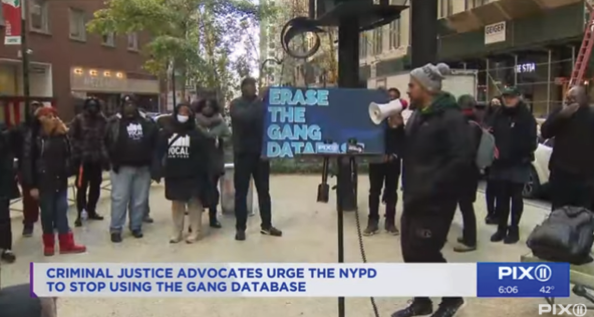by Daleel Jabir Muhammad
@DaleelJabir7
NEW YORK—Advocates recently promoted legislation to clear a controversial New York Police Department of Investigation (DOI) database that they argue keeps tabs on predominately Black and Brown residents in New York.
The G.A.N.G.S. coalition (Grassroots Advocates for Neighborhood Groups and Solutions coalition) gathered at a recent news conference to call for abolishing the database used to unfairly collect information on youth in New York City, and to prohibit any such information from being gathered in the future. Members of the coalition consisted of lawyers from the Legal Aid Society, Legal Defense Fund, Immigrant Defense Fund, Red Hook Initiative, and other counsel and activists.

Iesha Sekou, a Harlem resident, Street Corner Resources founder and activist, summarized that Black and Latino youth being targeted is a violation of their rights. “It is impacting not only for our kids to get jobs, starting careers, but also training, housing, and getting into colleges, because when they do a background check these names are displayed in the gang database, and that’s why it should be cleared. This gang database puts predominately Black and Latino men at a disadvantage to get work or to sustain themselves,” she said. Of the approximately 16,000 people registered in the database, 11,221 are Black and 4,729 are Latino.
Intro Bill 360-2022, sponsored by 21 City Council members, is a local law to amend the administrative code of the city of New York, in relation to abolishing the criminal group database and prohibiting the establishment of a successor database.
This bill would abolish the police department’s Criminal Group Database and prohibit the establishment of a successor database with the same or substantially similar features. Pending the ultimate destruction of records in the database, no employee of the city would be permitted to access the Criminal Group Database for law enforcement purposes.
The Inspector General for the Police Department would be required to notify persons named in the database and provide additional information regarding how persons may submit requests for records contained in the database, pursuant to the State Freedom of Information Law, prior to the destruction of such records.
Violations would be enforced by the Inspector General for the Police Department and punishable by civil penalties. In addition, persons aggrieved by a violation would have a private right of action to seek damages and other relief.
Legal Defense Fund advocates in a news release issued on April 18, 2023, stated, “The report identifies and publicizes a number of dangerous and alarming NYPD practices and failures, some of them long known by community advocates and residents, including:
• Members of the public have been added to the database as ‘known associates of gang members’ merely due to being friends with an alleged gang member on a social media platform or wishing them “Happy Birthday” on Facebook. Similarly, the NYPD treats being ‘frequent(ly) present in a known criminal group location’ as a criterion for entry into the database when the known criminal group location was merely a person’s home in a public housing complex.
• There were instances where a single NYPD staff person served as the reporting officer, reviewing supervisor, and endorser, resulting in little oversight of an individual’s addition to the database.

• The database, 99 percent of which is comprised of Black and Latino New Yorkers, is rife with stark racial disparities.
• Members of the public have historically been unable to find out whether they are part of the database, as the NYPD has routinely denied their Freedom of Information Law (FOIL) requests and appeals.
• Individuals were placed on the database based on their sealed arrest records, which is prohibited by state law.
• Parents and guardians of minors were not notified if their children were placed on the database.”
In response to the release of the DOI’s report, Legal Defense Fund (LDF) Assistant Counsel Kevin E. Jason issued a statement. “The Department of Investigation’s report identifies several ways in which the NYPD fails and oppresses New Yorkers by secretly surveilling them, but it reaches the wrong conclusion.
The NYPD’s secret surveillance database disproportionately targets Black and Brown New Yorkers, and the report’s recommendation to make the database a little less secretive and inconsistent ignores the risks of racial profiling, police harassment increased and elevated law enforcement stops, and possible police violence that individuals may endure after they are labeled as being affiliated with a gang,” the statement noted. “The truth is simple: the NYPD must abolish this database. This heightened, racialized surveillance breeds significant distrust in Black and Brown communities and is antithetical to true public safety.”
Ms. Sekou has long called for the abolishing of the gang database since finding out the way it was established several years ago.
“What this database did was more like profiling our youth. It was done secretly by NYPD,” she stated, even prior to knowing about the NYPD Criminal Group Database (CGD) otherwise known as the Gang Database. “And before the gang database actually started, they were taking pictures of kids from these neighborhoods, putting their pictures in the precincts.

Which meant that every time that the police officers came to work, they saw pictures of kids that would not necessarily be gang affiliated. They just had kids that they thought would be a problem for them.”
Babe Howell, professor at CUNY School of Law, said the information compiled on the gang database is “not based on criminality, no need for violence but simply based on what you post on social media where you live or who you know.”
She noted those various sources or engines where the data is derived from. In addition to social media posts, pictures, language, and hand signs can land someone in the gang database, and cops used sealed criminal records to place people on the list which they’re not supposed to do, the Department of Investigation found. In 10 percent of cases, officers added names to the database and then pretended they were supervisors and unscrupulously approved the entries themselves.
Andrew Case, senior counsel for Latino Justice said at a news conference: “There’s no reference to them referring those cases for discipline. There’s no question of what was done to individual officers who signed off as their own supervisors in the end.” He also stated that there was no indication of what plans were regarding the findings.
“First, before the database is cleared and the records should be expunged, parents should be able to see if their children were in there and have written documentation that it was and when it will be removed. Second, if being in the database negatively impacted people, they should be compensated justly.
Third, stop racial profiling our youth because of the clothes they wear or the way that they look. And lastly, clear the database, have NYPD be more transparent and do some real Intel on who may be a real problem in our neighborhoods,” said Ms. Sekou.
Photo: Screenshot from video by PIX11 News from a November 14, 2022, rally outside of New York City Department of Investigation where attorneys from the Legal Aid Society and others called for the results and release of an audit of the NYPD gang database
The Final Call













